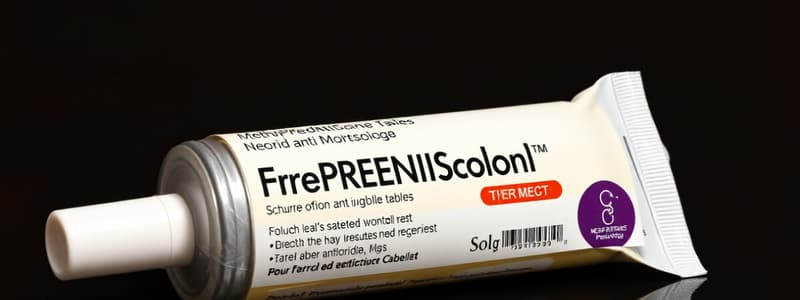Podcast
Questions and Answers
What is the classification of methylPREDNISolone?
What is the classification of methylPREDNISolone?
- Antibiotic
- Antihistamine
- Pharmacologic: corticosteroids (correct)
- Therapeutic: steroidal anti-inflammatory agents (correct)
Which conditions are indicated for treatment with methylPREDNISolone? (Select all that apply)
Which conditions are indicated for treatment with methylPREDNISolone? (Select all that apply)
- Inflammatory disorders (correct)
- Neoplastic disorders (correct)
- Autoimmune disorders (correct)
- Viral infections
What are some common side effects of methylPREDNISolone?
What are some common side effects of methylPREDNISolone?
CNS: depression, euphoria; CV: hypertension; GI: peptic ulceration, anorexia, nausea; hematologic: thromboembolism, cushingoid appearance.
What routes of administration are available for methylPREDNISolone?
What routes of administration are available for methylPREDNISolone?
What are some nursing implications when administering methylPREDNISolone?
What are some nursing implications when administering methylPREDNISolone?
Stopping methylPREDNISolone suddenly can result in adrenal insufficiency.
Stopping methylPREDNISolone suddenly can result in adrenal insufficiency.
Patients on long-term therapy with methylPREDNISolone should eat a diet high in ________.
Patients on long-term therapy with methylPREDNISolone should eat a diet high in ________.
Flashcards are hidden until you start studying
Study Notes
Classification
- MethylPREDNISolone is a steroidal anti-inflammatory agent and an immunosuppressant.
- Falls under the pharmacologic category of corticosteroids.
Indications
- Used for various conditions including inflammatory disorders, allergic reactions, hematologic issues, neoplastic diseases, autoimmune disorders, and as an immunosuppressant.
Side Effects
- CNS effects may include depression and euphoria.
- Cardiovascular complications can lead to hypertension.
- Gastrointestinal issues include peptic ulceration, anorexia, nausea, and adrenal suppression.
- Hematologic effects may involve thromboembolism and a cushingoid appearance (e.g., moon face, buffalo hump).
Route
- Administered via oral (PO), intramuscular (IM), or intravenous (IV) routes.
- Oral administration should be with meals to reduce GI irritation; avoid grapefruit juice.
Nursing Implications
- Monitor patient’s intake and output, along with daily weights.
- Observe for signs of peripheral edema, steady weight gain, rales/crackles, or dyspnea; report these to healthcare professionals.
- Be aware of possible hyperglycemia and hypokalemia; perform guaiac tests on stools and report any positive results.
Teaching
- Sudden cessation of treatment can lead to adrenal insufficiency, with symptoms like anorexia, nausea, weakness, fatigue, dyspnea, hypotension, and hypoglycemia, which can be life-threatening.
- Patients should report severe abdominal pain, tarry stools, unusual swelling, weight gain, tiredness, bone pain, bruising, nonhealing sores, visual disturbances, or behavioral changes.
- Long-term therapy advice includes a diet rich in protein, calcium, and potassium while being low in sodium and carbohydrates.
Studying That Suits You
Use AI to generate personalized quizzes and flashcards to suit your learning preferences.




